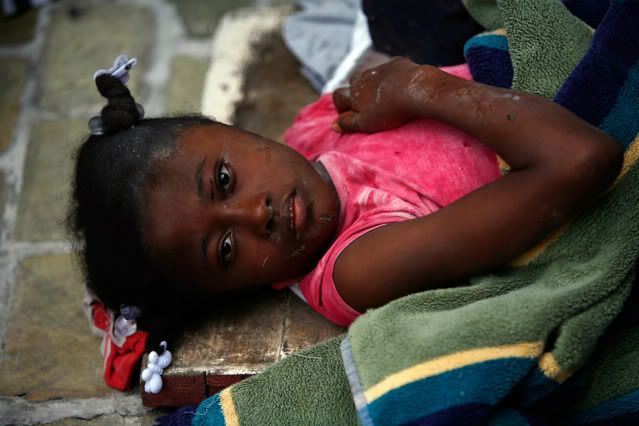
The international community is coming together in support of Haiti.
As I reported yesterday, Haiti is in total devastation in the aftermath of the 7.0 hurricane that hit the country Tuesday. All across the world people want to take action to help the people of Haiti in their time of need. As the damage is being assessed and aid organizations are coordinating efforts, regular citizens can best help the Haitian population through monetary donations. An article on
globalpost.com reports:
If you’re considering doing your part, that’s great. But, experts say, whatever you do, don’t donate anything but money. Under no circumstances should you mail care packages, toys, food or clothes. Don’t even think about sending drugs. The response to prior disasters shows that regardless of your intentions, you will only be making matters worse.
That’s what happened in the aftermath of the December 2004 tsunami. The disaster was followed by an unprecedented outpouring of global generosity. This dramatically facilitated the grisly chore of cleaning up the tens of thousands of bodies left under the tropical sun, and it funded a reconstruction effort that, while far from perfect, provided roofs over the heads of many.
But aid workers joked that the real tsunami was followed by another tsunami — of misguided goodwill. In an effort to help, people shipped boxes, often following the instructions of local television news programs. And so in Aceh, Indonesia amid the trauma, hunger and devastation, care packages piled up containing everything from pajamas and teddy bears to birth control pills and Bibles — a hodgepodge impossible to sort through. There were boxes filled with half-used ointments and prescription drugs, as if do-gooders had cleaned out their medicine cabinets. And some unscrupulous corporations — exploiting tax write-offs for soon-to-be-expired pharmaceuticals — apparently shipped whatever had been lying around the warehouse for too long.
It all amounted to a mountain of materials that confounded the efforts of the pros, and made it more difficult to deliver essential supplies on the earthquake-ravaged roads.
Months after the aftershocks stopped, the French aid organization Pharmaciens Sans Frontieres (Pharmacists Without Borders) conducted a study of that second tsunami. In a world where most people lack adequate access to medicine, the results were a travesty.
The group found that although officials didn’t request any medicine, they received 4,000 metric tons of it, or more than 4 pounds for each person in the tsunami-affected area. There were multiple-year supplies of antibiotics, and palette loads of drugs unknown to health care providers. Seventy percent of it was labeled in a language that locals did not understand.
Disasters like the Haiti earthquake and the Indian Ocean tsunami present colossal logistical challenges. Nonetheless, in Aceh officials and relief workers did their best to sort through this stock: Drugs were stored in private homes, in hospitals rooms and corridors (despite a desperate shortage of space for patients). Eighty-four percent of the facilities lacked air conditioning, rendering their contents unusable, according to the study. A large depot near Aceh’s airport was so overwhelmed that mountains of pricey pharmaceuticals were dumped outside to rot under the monsoons and tropical sun.
Of course, the donors were only trying to help, but misplaced intentions actually worsened the suffering. Buried under care packages and out of date antibiotics labeled in Thai and Chinese were the world’s most advanced malaria medications. Meanwhile along the coast, people who had just lost homes and families writhed in malarial fever for lack of treatment.
In the end, most of the drugs had to be incinerated — you can’t simply send such a stock to the dump, where it would seep into the ground water and create another health hazard. That cost donors and the Indonesian government millions. (read the entire article)
It is the best of human nature to want to help in times of disaster but we must consider how to best aid those in need. We must also be careful of criminally minded individuals who will use this travesty to steal donations.
Seven Magazine (which I found via
blacksnob.com) posted a list of trusted organizations who are taking donations to aid Haiti. Check out the sites for more information.
 The international community is coming together in support of Haiti. As I reported yesterday, Haiti is in total devastation in the aftermath of the 7.0 hurricane that hit the country Tuesday. All across the world people want to take action to help the people of Haiti in their time of need. As the damage is being assessed and aid organizations are coordinating efforts, regular citizens can best help the Haitian population through monetary donations. An article on globalpost.com reports:
The international community is coming together in support of Haiti. As I reported yesterday, Haiti is in total devastation in the aftermath of the 7.0 hurricane that hit the country Tuesday. All across the world people want to take action to help the people of Haiti in their time of need. As the damage is being assessed and aid organizations are coordinating efforts, regular citizens can best help the Haitian population through monetary donations. An article on globalpost.com reports:


